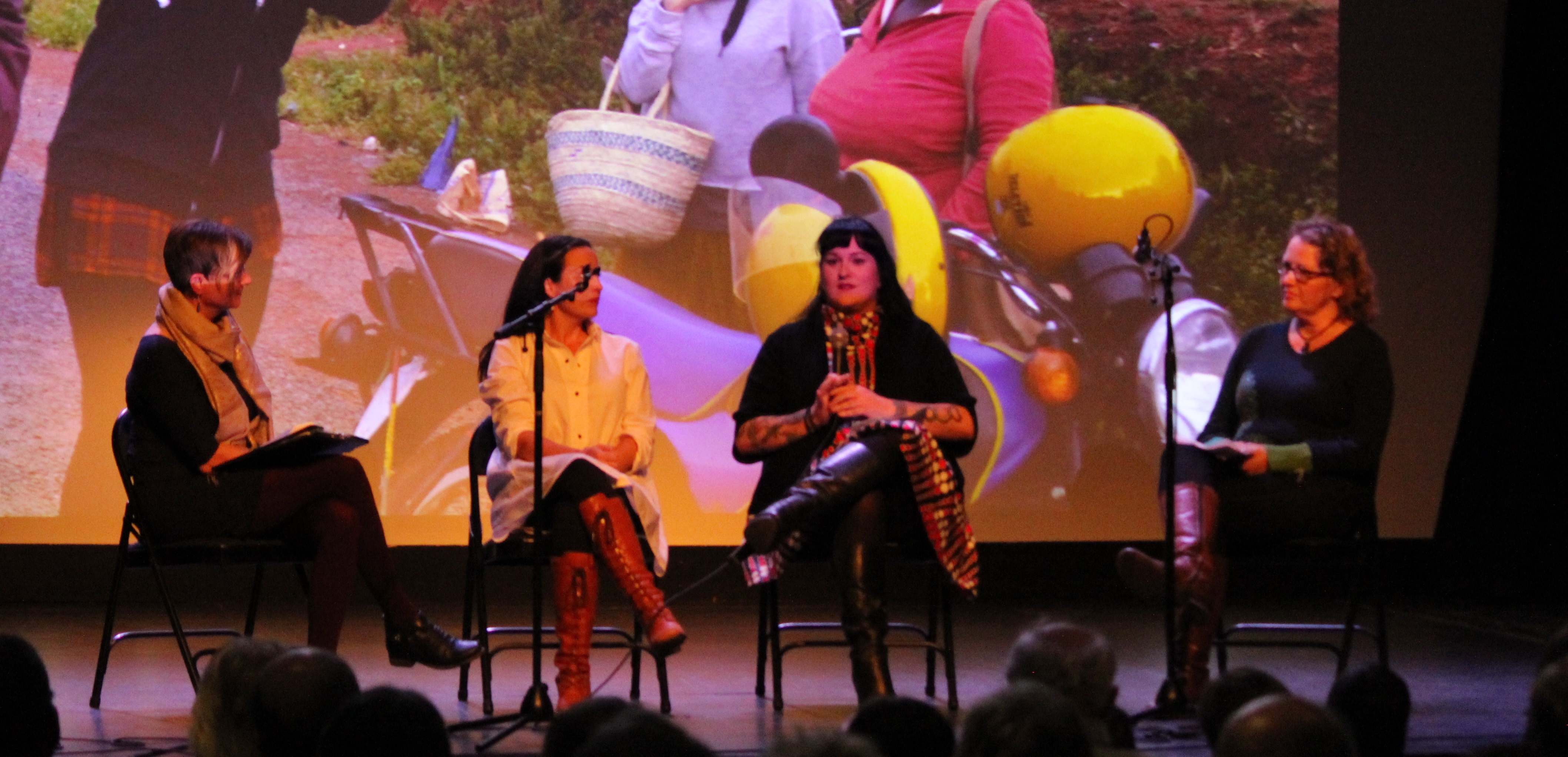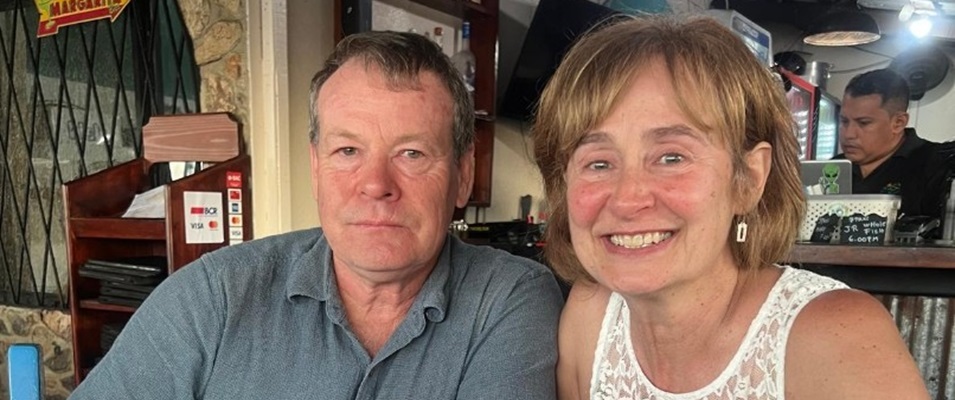
On October 15, a new documentary film premiered at the Park Theatre in Winnipeg to a crowd of about two hundred—a film that stars Niverville farmer and entrepreneur Colleen Dyck, chronicling her recent journey to Kenya to work alongside a local farmer and live the African experience.
The film is called Common Strength, and it was created by the Canadian Foodgrains Bank (CFB) to explore the important role that women play in ending world hunger. The film seeks to celebrate the strength of women who, given just a few tools, can make a vast difference in the lives of their families, communities, and the world.
Dyck, selected from a host of candidates across Canada who applied to participate in the unique project, travelled to the eastern African nation to meet Lucy Anyango, a Kenyan farmer in the small village of Busia. For one week, Dyck lived and worked alongside Anyango, in the process witnessing the plight of women who struggle to survive and feed their families.
Dyck resided in the humble family home with Anyango and her five children, resting at night behind a makeshift curtain and toiling by day in the thirsty soil of the family’s small agricultural plot.
All the while, the pair was followed by a Kenyan film crew and several CFB staff.
“I think what surprised me is that I didn’t expect to feel so welcome right away,” Dyck says. “I wasn’t sure what I was walking into… I’m an emotional person and I didn’t trust my face because it shows things when I don’t want it to show things. But Lucy was so warm and so protective of me.”
Fully immersed in the culture, Dyck demonstrated raw vulnerability in the film as her strength was challenged while carrying water the way African women do numerous times per day. As well, her gender required her to display stoic acceptance within a culture where women traditionally have no voice and few rights.
In a post-screening Q&A, Dyck regaled the audience about how difficult it can also be for men in cultures so steeped in traditional gender roles. For example, on one occasion Lucy’s husband went to the market to retrieve spices for the women. He was mocked and ridiculed, and even paid a visit by an upstanding male member of the community who chastised him for this deed, which was apparently below his calling as a man.
These poignant moments of the film are peppered with light-hearted ones, too. In retrospect, Dyck laughs now at how openly emotional she became when asked to kill the family chicken for dinner. She’d never had to kill anything before.
She also laid bare her humility during an African celebratory dance. After all, her feet, she says, “have no rhythm.”
The Mission of CFB
The CFB, a charitable organization established in 1983, has one goal: to end world hunger. To accomplish this, they provide emergency food in times of need, agricultural tools and training so that the hungry can learn to feed themselves, and nutrition support and advocacy. As well, they work with foreign governments to create policies that will help end hunger locally and globally.
According to Carol Thiessen, Senior Policy Advisor for the CFB, more than 820 million people go without food on a regular basis. That equates to about one in nine people.
Women, Thiessen says, are more likely to go hungry than men in almost every area of the world because, in times of crisis, women are most likely to sacrifice their own food so their families can eat. In some cases, these women then turn to small-scale farming to feed their families, but they face many barriers. They don’t have access to land, seed, or good training programs. Plus, their lives are very busy with children and elderly parents, as well as collecting water and wood for fuel.
In many countries, women also aren’t eligible to apply for paying jobs. As a result, their husbands must leave home in search of work, oftentimes returning to the family home only once or twice a year.
However, according to CFB research, women who are able to create an income from a plot of land are likely to reinvest up to 90 percent of this income into their own households, thus improving their children’s health and ability to get an education.
For this reason, the CFB has developed a program called Conservation Agriculture, a method of farming that improves soil health and increases yields. While the method goes against traditional farming techniques in many underdeveloped countries, it has been proven to improve the nutritive value of food, decrease overall labour requirements, and provide greater bounty which can be sold at markets for a profit.
Conservation Agriculture in Action
Anyango has been a recipient of the CFB’s training in these techniques and has become a living testimony to its effectiveness in empowering women. As well, her neighbours have witnessed a visible difference in her children’s health.
Anyanga has since become a leader in her community, teaching farming techniques to others in her village. She also heads up her own organization which provides local support and aid. Members of her organization make small deposits into a savings account which is then used to help others get their start in business and pay for school fees or household necessities.
“Research shows that if women had the same access as men to productive resources such as land, seeds, water, etc., they could increase their yields by 20 to 30 percent,” says Theresa Rempel Mulaire, Conservation Agriculture Program Manager for CFB. “That would mean a reduction in hunger around the world of 100 to 150 million people.”
The CFB is currently working with 50,000 small agricultural landholders in Ethiopia, Kenya, and Tanzania, more than half of which are women. On top of training, the CFB also works at sourcing farm implements from African fabricators and blacksmiths and they are looking at ways to mass-produce these items to bring down costs for local farmers.
“I’m really excited to say now, as we’re entering our fifth and final year of the project, that we have over 90 percent of our target already reached,” says Mulaire. “Last year, in Ethiopia… the minister of agriculture put out a proclamation saying that Ethiopia is supporting conservation agriculture and they want to really push that down to the community levels.”
The program has proven to be effective in more ways than one. Mulaire adds that the program, which has been embraced mostly by women, is providing opportunity for cultural shifts through which many husbands are seeing the benefits, too.
“The women who are in the [Conservation Agriculture program] are fighting to show that it works. And the husbands say, ‘Oh, you’re making a little bit of money. Maybe I’ll come home,’” says Meagan Silencieux, Public Engagement Officer for the CFB. “Very quickly… they’re working alongside their partners. They’re doing things that other men might laugh at them for. They’re doing dishes and taking care of the kids. It’s a radical change in behaviour, culturally and gender-wise. It blew my mind to see how quickly that happened.”
No Preconceptions
Dyck says she went into the experience with few preconceived notions of what to expect. The biggest surprises, she admits, were not the ones she anticipated.
“It was so neat to watch Lucy outside of her family environment, where she’s a community leader. She’s looked up to and you see how much respect they have for her,” Dyck says. “I saw her be her powerful female self and it was beautiful to watch.”
Along with Dyck, the CFB team was thrilled at the outcome of this experimental filmmaking experience and they hope many will be moved and motivated by its viewing.
“Colleen entered into this project and this experience with so much vulnerability and humility,” says Thiessen. “She had to put herself way out there to do this and we are just so thankful [for her].”



















